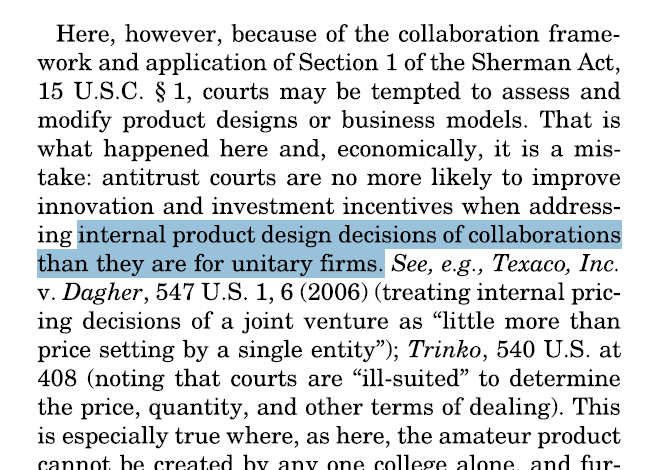I am finally reading the cert-stage filings in NCAA v. Alston. The NCAA and allies argue its employer cartel is a "product design" choice and accordingly should be protected from antitrust scrutiny. Short  https://www.scotusblog.com/case-files/cases/national-collegiate-athletic-association-v-alston/
https://www.scotusblog.com/case-files/cases/national-collegiate-athletic-association-v-alston/
 https://www.scotusblog.com/case-files/cases/national-collegiate-athletic-association-v-alston/
https://www.scotusblog.com/case-files/cases/national-collegiate-athletic-association-v-alston/
This argument ignores longstanding precedent that the antitrust laws protect sellers and buyers equally. See e.g., Mandeville Island Farms v. American Crystal Sugar https://supreme.justia.com/cases/federal/us/334/219/
The NCAA's position would immunize all sorts of employer cartels and other buyer-side collusion done through trade associations. Firms could cite lower costs of production and even consumer "taste" for exploited labor to defend their collusion against workers and suppliers.
Remarkably, a group of economists (including Nobel laureate Daniel McFadden) equates the labor market rules of the NCAA (an association of independent colleges and universities) with the product design decision of a *single* integrated business
The NCAA can defend its collusion against players and cite some supporting authority in part because of antitrust's present consumer welfare orientation https://blog.harvardlawreview.org/challenging-the-ncaa-cartel-when-consumer-welfare-equals-worker-exploitation/
The Supreme Court in NCAA v. Board of Regents blessed "amateurism" in dicta because it "widen[s] consumer choice"
If the NCAA wants to protect its labor arrangements from antitrust right now, it can recognize players' unions (like the NBA, NFL, and NHL do) and make labor market rules the subject of collective bargaining (and an associated antitrust exemption).
I exclude MLB because it has its own expansive, peculiar, and undesirable antitrust immunity, thanks to the Supreme Court https://global.oup.com/academic/product/the-baseball-trust-9780199930296?cc=us&lang=en&

 Read on Twitter
Read on Twitter
![The Supreme Court in NCAA v. Board of Regents blessed "amateurism" in dicta because it "widen[s] consumer choice" The Supreme Court in NCAA v. Board of Regents blessed "amateurism" in dicta because it "widen[s] consumer choice"](https://pbs.twimg.com/media/EtKhJz9XYAARmHO.png)


